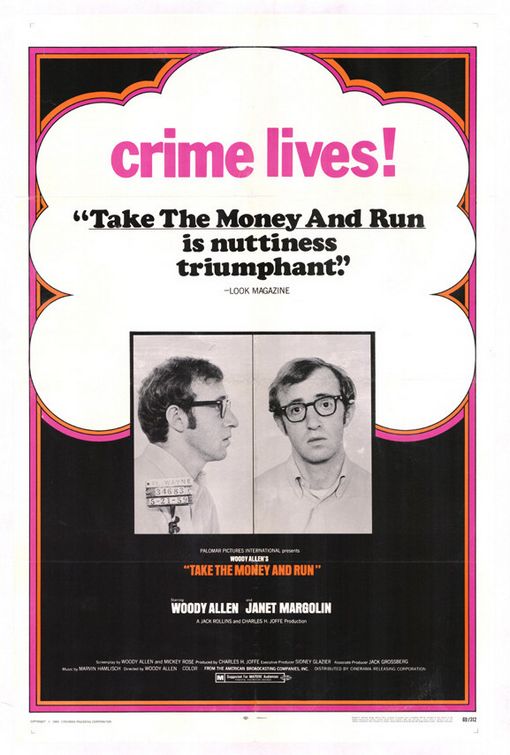
Cast: Woody Allen, Janet Margolin
Released: 1969
Take the Money And Run is the first movie written, directed and starring Woody Allen (What’s Up, Tiger Lily? doesn’t really count in our books). It is the first time he took complete creative control – having been burnt on both …Tiger Lily and Casino Royale. It is the first time we can call Woody Allen a film auteur.
What did he do with this freedom? He made a pretty funny film.
Take the Money And Run is a highly regarded comedy – the first of a run of purely comedic films Allen would make (or, as Allen coined them, the “early, funny ones”) before heading into more interesting ground. It holds a 93% on Rotten Tomatoes.
The film tells the story of Virgil Starkwell, played by Woody, a bank robber. Told as a mockumentary, we learn about his chilhood, his first crimes, his arrests, his getaway, and his eventual fate. What it really is though, is a chance for Woody Allen to create sketch after sketch of absurdist humour.

A lot of the ideas come from Woody’s stand up – being beaten up my thugs with a cello, the hostage negotiation, etc. Allen stays pretty much in the persona he’s painted himself into by this point. There’s lots of physical comedy, and plenty of great one liners. It’s pretty clear that Allen just wrote lots of sketches and threw the film together. And it’s almost all Allen – he’s in just about every scene.

By all accounts, that throwing of the film together was a difficult process. Allen had initially wanted another director (Jerry Lewis), not believing he was up to the task himself. He wrote too much, and his crew was scared of the number of work they had set out for them, in just an 8 day shoot (in San Francisco).
His original cut was a mess, and he was encouraged to re-edit the movie with Ralph Rosenblum. Rosenblum would work with Allen up til Interiors. With the help of Rosenblum, the movie was streamlined, given some more structure and given a new ending – cutting the original ending where Virgil dies.
The end result definitely feels like a 60s film. There’s shades of Monty Python – being surreal to be subversive. Allen even used legendary radio voice Jackson Beck to narrate. You could see why the stoner crowd who loved Casino Royale loved this. The seriousness of banking, police and even documentaries themselves are made fun of. It is a bit of a crowd pleaser.

It’s a strong start for a comedian, but one can’t help but feel in the Woody Allen canon, it falls short. The humour is broad, and every character sounds like Woody Allen. It is impossible to see any shades of Annie Hall in this – or even Love And Death.
The film was released to great acclaim, but that may have come from the good will of Woody Allen himself. It was financed as a one-off deal with Palomar Pictures, who must retain some rights, preventing it from being properly collected into a box set. This business lesson, and plenty of film-making lessons, were learnt on the making of this film. A legendary film career was just beginning.




1 Comment
LOVED this movie…….and the classic miss-spelt note he used to hold up the bank “I have a gub”…classic classic Woody Allen!